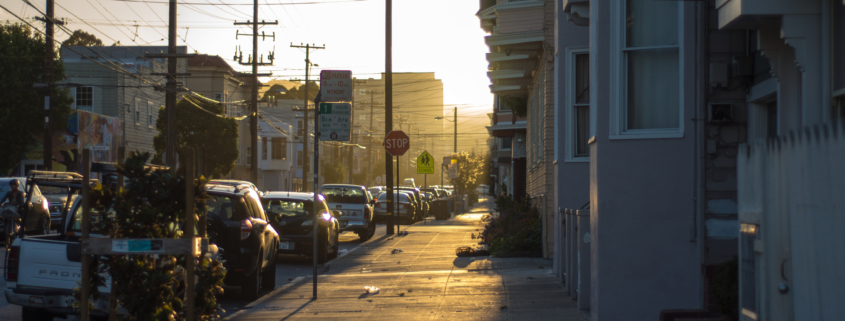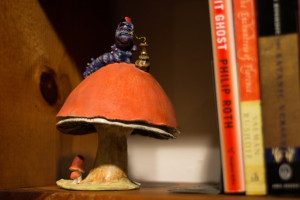Avoiding Fedoras: A Guide to Authentic Living
The trope of the writer in a dusty room with his fingers teetering over the keys of a typewriter is well worn. A cigarette dangles from his lips. A pot of coffee smolders in the corner. Magazines and sheaves of paper scatter the floor. Perhaps a cat lounges on the sofa, or watches pigeons on the ledge outside a grimy window. The writer might walk to the bodega on the corner to purchase a carton of eggs, a pint of orange juice, and a pack of cigarettes, before returning to the vaunted seat before his desk. His sanctuary. The image is romantic in an almost pathetic way, in the way of sacrificing sanity for art. A writer who foregoes the higher tiers of Maslow’s hierarchy of needs in favor of his craft. He is Zen. He is a Buddhist, chanting literary incantations into the blank page.
When I began writing, the pull of this old man—the Vonnegut, the Faulkner—drew me in. I eschewed social interaction. I boasted proudly to no one in particular that I was a writer, damnit, and I didn’t need any beauty beyond what might come tumbling out of my mind and into my fingers. Tap-a tap-a tap-a. I developed a routine. I would come home, put on my headphones, lock my door, and ignore the knocking from my roommates who would ask me to come out and play. Alex can’t come out and play; he’s busy, writing masterpieces.
* * *
A few years ago, I had a friend who’d become deeply involved with the Pick Up Artist (PUA) scene. It seemed as if every couple of weekends he’d jet off to sit in a packed convention hall with hundreds of other men looking for ways to be better at, well, picking up women. He bought a book about it; he kept it on his bedside table.
My friend was a prime target for whomever put on these conventions. He was pulled in by the promise of women knocking at his door, at the potential to be desired. It’s not that he was a player, he explained, it’s just that it’s hard to find a partner when he isn’t meeting anyone. “I’m not looking to bang bitches,” he said, “I want to find love. I just don’t know how to talk to women.”
He learned the techniques. Canned pickup lines. Underhanded compliments. Negging. Animated men in button-downs, sleeves rolled up to the elbow, walked around a stage and spoke into headset-microphones about how much success they’d had. How many numbers they could pull in a night. How many women they had stored in their cellphones. How, if you follow these simple steps, you too could be swimming in pussy.
At the bar with my friend, we nursed our drinks and eyed potential partners. He explained to me how you needed to make an observation about her appearance without being too complimentary. “Let her know you’re paying attention,” he said, “but don’t give her the validation she seeks.” These words made me cringe. He is a kind man, I thought. We’ve embraced. We’ve shared vulnerable moments. We’ve smoked cigars late into the night and shared our hopes. These are not his words. These are not his ideas. Where has he gone? Where did that fedora come from?
We stopped talking for a while; I was not interested in hearing about his latest theory on “what women want” and I avoided social gatherings with him, especially ones that might include the targets of his new hobby. Our circles drifted apart for a time.
A few months later, I saw my friend at a house party. We stood in the kitchen, talking about things that friends might talk about. Jokes. Sports. Green cards—we are both Canadian. Then I asked him, with a not-quite-playful smirk, “How’s that PUA thing going for you?”
He grimaced. “I’ve stopped doing that,” he said. “I went to this one talk where the guy basically told us to stop trying to pick up girls. He told us to just be interesting, to be passionate about something. So that’s what I’m doing now. Can you help me pick out a motorcycle?”
* * *
Where does the balance lie between the writer, sequestered in his room with a brain full of ideas, and the man experiencing life with open eyes and a willing heart? Is the old man writer trope just as fraught as the fedora-clad “player” reciting lines as if from a screenplay? Where does the authentic human live behind the mask of the depressive writer?
I’ve read some of the work I produced while holed up alone in my room, and, well, it’s not good. It’s awful, actually. It is self-obsessed, mildly-to-moderately insensitive, and, frankly, cliché. Like my friend and his canned pick up lines, I was trying to impress readers with practiced technique. This sleight of hand doesn’t work, though. It turns out it’s impossible to create compelling human characters when the only human you are interacting with lives in the dusty mirror. It turns out that story lines that ring true require the writer to live, to experience affection, annoyance, thirst, anxiety, and warmth. Being a writer is more about noticing the world than creating a new one from scratch, about catching the oddity of life at a certain angle of refraction. In my need for affirmation as a writer, I avoided the joy of writing just as my friend had ignored the joy of deep human connection.
Now I make space for experience. I carve out time for friends, for nature, for taking neighborhood walks. For having long, protracted conversations with the Palestinian man on the corner about the Middle Eastern peace process. For swinging lazily in the hammock. For gathering figs from the fig tree. For watching the world speed by from a moving train. For engaging with the literary community. This last one, above all, has changed the very nature of how I write. Since starting my MFA, I’ve come to realize that writing is a long conversation, an artistic dialogue we have with history and, more importantly, with other writers.
Like my friend who was once fixated on picking up chicks, I’ve learned that what makes a great writer—or a great partner—is the same thing that makes a great person: curiosity, compassion, empathy, experience. I realized that the goal—for him, romance, and for me, creation—should remain in the periphery, a byproduct of a life well lived. Of course, many of the most interesting of humans will die without ever having told their stories; writing is still a task. It is still a concerted effort, and nothing will change that. But, for me, holding a balance is paramount to creating meaningful work and a happy existence.
Neither my friend nor I were driven by insidious intention when we erred from the path of authenticity. He truly needed affection. I truly wanted to capture the beauty of the world and, dare I say, publish a book. We looked for shortcuts. We learned technique. We applied ourselves to our studies. But eventually we learned that this was not enough, that life is its own adventure, that it bears its own exploration.
Some writers will point at themselves, poke outstretched fingers at their sternums, and proclaim, I am writer. This is who I am, not what I do. It is the very essence of what they are. I fear this does not tell the whole story. We are social creatures. We are naturally engaged in the world around us. We are not just writers: we are mothers, sons, aunts, and uncles. We are watchers of movies, smellers of dahlias, eaters of bacon. We are simple. We are complex. We are not tropes.
Maybe I’m not a writer.
I’m okay with this.
Alex Simand is a MFA candidate at Antioch University Los Angeles. He writes fiction, creative nonfiction, and poetry. His work has appeared in such journals as Red Fez, Mudseason Review, Five2One Magazine, Drunk Monkeys, and others. Alex is the current Blog Editor for Lunch Ticket and past Editor of Creative Nonfiction and Diana Woods Memorial Prize. Find him online at www.alexsimand.com or on Twitter: @AlexSimand.







